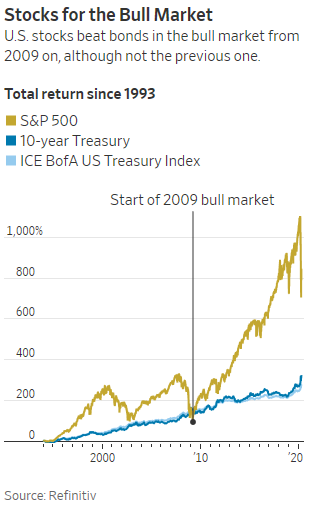Oversimplified, really, and beginning with the time frames I use below.
Let’s say the Wuhan Virus situation and the associated stay-at-home moves the several States apply—particularly the latter—lead to a drop in our GDP of 30% (a drop I pulled out of rectal storage and that is a drop being bandied about as the economic cost of Germany’s and the EU’s moves in response to their Wuhan Virus situation).
Let’s say further, that the stay-at-home response lasts for one month and for two months. What’s the so what for these alternatives?
A 30% drop in GDP means that our total national output of goods and services—the aggregation of us individual citizens’ spending and earning along with those of our businesses—would drop by 30%. Keep in mind, too, that private spending accounts for roughly 70% of our GDP.
Were the stay-at-home policy to last one month, and then we’re back on the streets and at work, that 30% drop—the vacation trips we didn’t take; the cars we didn’t buy; the groceries we didn’t buy; the rent or mortgage payments we didn’t make; the jobs we didn’t work, the products our employers didn’t produce; the income the banks, dealerships, and travel facilities didn’t take in—all of these would hurt, a lot, but these are things all of us can last through. That includes the businesses that employ us so we have jobs to go back to, earning income to spend and save, and the businesses can start getting their own income stream going again.
This won’t happen all at once; the recovery will ripple. We spend and businesses reemploy so we have income to spend. That initial pairing is the key; both have to happen roughly together at the outset, and so they will happen only with what I’ll call the primary pairing: goods and services that we as individuals must have to survive: groceries, fuel for our transportation to get to the stores and our jobs; and that our “primary” businesses need: our rent/mortgage payments, income from our necessities buying.
As those get going again (grocers, for instance, are on bare bones manning during the present situation), farmers and other food producers can produce, food processors can process, other necessities producers and processors can get going again and so hire again—and reemployment and income production, and spending, expands. Probably pretty quickly, too, as actual income won’t be needed universally to feed this growth: we’re a debt-driven economy, and (nearly) everyone’s credit will still be good.
The problem arises if the broad-based stay-at-home reaction lasts for two months. Aside from that resulting in an additional 30% drop in GDP—in our spending and earning along with those of our businesses—it would result in a more critical outcome: bankruptcy and businesses disappearing.
The most vulnerable are tiny-margin businesses—grocers, for instance—and the mom-and-pop and other small businesses, entities that have the bulk of our nation’s jobs. These businesses, aside from the thin profit margins on which they inherently operate, also operate on thin lines of credit. And us individuals operate on thin savings.
Two months may be longer than we—especially those businesses—can last. The businesses, in widespread fashion, are likely to go bankrupt and associated jobs disappear. That breaks that essential first-step pairing of our spending and our returning to our jobs to earn income to spend (and save).
That’s a much harder state from which to restart our economy, and that likely would take much vaster Government intervention to effect. And that’s something we don’t want to have happen.

